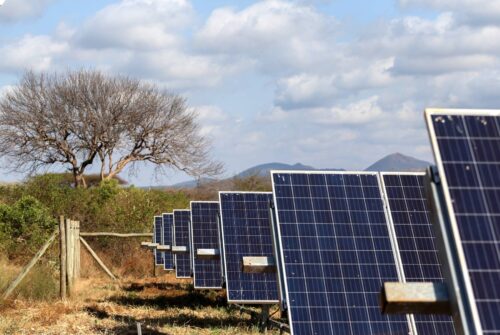
RMI Launches Its First Africa Fellowship Program Cohort in Nigeria to Advance Renewable Energy Projects
RMI’s Energy Transition Academy (ETA) is thrilled to launch its first global fellowship program offering in Nigeria. The cohort — comprising 20 energy practitioners from four Nigerian distribution companies — is actively working to advance clean energy projects. The fellowship, which runs until May 2023, will empower fellows to lead the deployment of renewable energy projects linked to the grid.
Abuja, Nigeria – December 1, 2022
RMI launched the Energy Transition Academy (ETA) Global Fellowship Program in Nigeria, with funding support from Shell.
The Nigeria fellowship program offering is the first ETA Global Fellowship Program for West Africa and the third cohort of the global program. With this expansion, the ETA Global Fellowship Program now includes 48 energy professionals from 16 countries spanning the Caribbean and sub-Saharan Africa.
The fellowship program is designed to support utilities in advancing renewable energy projects, promoting reliable and resilient energy access, and acting on climate change.
This cohort includes 20 participants representing four Nigerian distribution network companies (DisCos), including Abuja Electricity Distribution Co., Ikeja Electric, Eko Electricity Distribution Co., and Ibadan Electricity Distribution Co.
Fellows have backgrounds in a range of disciplines such as engineering, project management, finance, and law. In the new group, 35 percent are women, representing a concerted effort by RMI and participating DisCos to diversify participants.
“The ETA Global Fellowship Program is designed to build the capacity of local distribution companies by upskilling well-positioned professionals who can serve as clean energy champions to advance the development and scaling of utility-enabled renewable energy projects in Nigeria,” says Raul Alfaro-Pelico, Senior Director, Energy Transition Academy, RMI.
“This capacity growth is critical to meet the goals of Nigeria’s Energy Transition Plan. Inclusion of a balance of young professionals, seasoned energy practitioners, and women representing the sector is critical to advancing the energy transition in Nigeria.”
Universal access to electricity in Nigeria is a national development priority. Today, more than 90 million Nigerians lack access to electricity and millions of those connected to the grid have less than 12 hours of electricity per day.
“The Nigeria Energy Transition Plan seeks to add 30 GW of new installed capacity by 2030, with at least 30 percent sourced from renewable energy. As noted in the national plan, Nigeria’s net-zero pathway will result in significant net job creation with up to 340,000 jobs added by 2030 and 840,000 by 2060,” says Suleiman Babamanu, Nigeria Program Director, RMI.
“This transition requires investing in the people doing the work to advance distributed renewable energy, and the fellowship program is designed based on the training needs identified by RMI, participating DisCos, and fellows.”
The five-month fellowship program, which focuses on technical training and peer learning, mirrors ETA’s Caribbean fellowship program for utility professionals, offering a deep dive into project development and management for utility-enabled renewable energy projects. The program curriculum for the Nigeria cohort is provided by technical experts from RMI’s Nigeria team, the Lagos Energy Academy, Nigeria-based minigrid project developers, and a range of other international experts.
“Lagos Energy Academy (LEA) was established by Lagos State Government (LASG) to provide world class hands on technical engineering training important to the power and energy sector value chain. Given our wealth of experience in capacity building, collaborating with RMI on this laudable project, is a step in the right direction towards the realization of the Nigerian Vision 2060 and continuing to develop skills and knowledge across the sector to advance renewable energy development,” says Mrs. Adewunmi Bukola Siwoku, Head, Lagos Energy Academy.
In addition to a technical training component, fellows will learn first-hand from other DisCos and experts in the field with technical training and hands-on opportunities from project conception to commission. They will also exchange lessons learned and best practices in project development and management. The curriculum is designed to respond to the training needs of participating DisCos and showcases leading regional examples of renewable energy projects. RMI is offering the Nigeria cohort of the global fellowship program thanks to funding support from Shell.
“We are excited to partner with RMI’s Nigerian DisCos Workforce Initiative as part of our support to the country’s Energy Transition Plan and to further the development of clean and reliable energy in Nigeria,” says Yischai Beinisch, Head of Shell Emerging Markets Power, West Africa.
To learn more about the Fellowship Program and the Energy Transition Academy, visit www.energytransitionacademy.net.
For a look at ETA’s existing work, see Changemakers of Today, Leaders of Tomorrow: Empowering Leaders of the Clean Energy Transition in the Caribbean
Note to editors:
Suleiman Babamanu, Nigeria Country Director, RMI Africa Program, is available for comment.
For media inquiries, please contact:
Maxine Chikumbo, RMI, at mchikumbo@rmi.org or Benson Kibiti, RMI, at bkibiti@rmi.org.
About RMI:
Rocky Mountain Institute (RMI) is an independent, nonpartisan nonprofit founded in 1982 that transforms global energy systems through market-driven solutions to secure a prosperous, resilient, clean energy future for all. In collaboration with businesses, policymakers, funders, communities, and other partners, RMI drives investment to scale clean energy solutions, reduce energy waste, and boost access to affordable clean energy in ways that enhance security, strengthen the economy, and improve people’s livelihoods. RMI is active in over 60 countries.
More information on RMI can be found at www.rmi.org or follow us on Twitter @RMIAfrica.
